In the previous post we explored why post-Christian cultures have been drawn to the Star Wars myth concerning the religion of The Force. You can read the first part by clicking here: Part 1
Now in this final part I wanted to reflect on the most recent Star Wars movie that was released in theaters about twelve days ago: Episode VII: The Force Awakens. I don’t intend this to be a review. I have written a short review about what I thought about TFA as a movie going experience. You can read that here: RT Reviews. I can say in summary that I really enjoyed it. It was a return to classic Star Wars that gave us a fun story, relatable characters in a imaginative galaxy.
While I do not intend to give a detailed review in this writing, I will be referencing specific parts of the movie throughout this writing, so if you have not yet seen the film or do not want any key plot points spoiled, do not read any further until you don’t mind reading about those things. Consider this your SPOILER WARNING!!!
So what does the movie reveal about the Force? And how does this film reflect how faith and religion are currently perceived and experienced in our current time?
The Force, Persons and the Loss of Philosophy
Why does Star Wars and its ideas of the Force have such an initial appeal? I believe it comes from the western world’s near total loss of philosophical study and thought. Particularly, the loss of a philosophy of the human being. I am not an expert in philosophy but I am coming fresh off of two years of philosophy studies at seminary. So, while I would never claim to have mastered this school, I at least can identify some of the more fundamental content and also notice when something is not being informed by philosophical thought.
Where can we trace this loss of philosophy informing and under girding our thought? First, much of this sprung from our world going through the experience of two World Wars in the span of one century, leading to a loss of human life on a scale never recorded in any previous occasion of warfare. When these traumatizing events occurred, many people’s faith was shaken and particularly faith that there was overarching and universal Truth for all of humanity and reality. Seeing the Nazi’s rise to such expansive power with the intent to impose their “order” on all who live under their rule lead to a skepticism toward claiming that there is order and universal truth in the world.
This skeptical rejection of universal truths and laws may have exponentially expanded because of the events of the 20th century, but it was not birthed there. Throughout the 18 and 19th century , the seeds of this thinking were already planted by philosophers such as Descartes, Locke, Hume, Berkeley, and Kant followed by Hegel and Nietzsche. While Medieval philosophy, mostly developed within the context of the Christian Church, drew from the works of ancient philosophers and spent much time reflecting on them and finding correlations with Christian theology, modern philosophy entered an era of skepticism of both medieval and ancient philosophy and set out to start from a new foundation.
With these new ways of thinking, what becomes lost is any classical understanding of human anthropology. In addition, a chasm forms between the natural and supernatural world. Many philosophers denied outright that we could say anything about the supernatural and denied that the natural world has any real relationship with the supernatural. This gulf between these two realities lead to a shrinking perception of the supernatural realm and in turn a diminishing view of God’s relationship with the natural world, particularly with the human beings in that world.
Evangelical and protestant Christianity, being dominant in the New World, reacted to the growing skepticism in philosophy toward God and the supernatural by choosing to reject philosophy as a viable or worthwhile form of study. This retreat from philosophy lead to a deeper rift in the west between Christianity and the world. While Catholic philosophers attempted to form bridges and sought to reveal the relationship between philosophy and theology, most protestants Churches gradually abandoned studies in classical philosophy and human anthropology.
So, how does this get us to where we are with Star Wars and The Force? The original story for Star Wars created by George Lucas in the early 70’s, was put to film and arrived in theaters in 1977. The early 70’s come just after a tumultuous time in U.S. history. The people who served in the Second Word War returned home and many of them struggled to deal with the effects that the war had on them. Many men were distant in their homes and struggled to parent their children. The role of fatherhood began to be seen as someone who would work long hours and relinquish any role in the family to their wives. But, because of the horrific war experiences many men saw their own faith shaken and from the brutality they experienced they remained estranged and distant in their own homes. This was before illnesses such as PTSD were ever recognized or diagnosed.
Star Wars, at its most basic level can be seen as a reflection of familial brokenness told using a palatable and simple mythological framework. Why? Because, if George Lucas understood anything it was this: how do people interpret reality but through parables or mythic stories. Star Wars was different from other movies because it created a distance between our real problems in our families and in our world and yet spoke about them using the genre of sci-fi fantasy. It allows people to look at the problems while creating a safe distance. This is similar to how a comedy can touch on very serious issues but with satire so people laugh instead being angry or offended. George Lucas was reacting to the problems in the world that he saw, primarily, that humanity no longer saw themselves as sharing in a common story or belief. All the skeptical philosophies and the World Wars cast doubt on whether humanity shares a common reality and shares a common vision of how we are to live in the world.

Han Solo, in the first Star Wars (now titled Episode 4: A New Hope) expresses the skepticism of the world: “I have flown from one side of this galaxy to the other and I have seen a lot of strange things but I haven’t seen anything to make me believe there is one all powerful Force controlling everything.”
Lucas’ answer to Han Solo within Star Wars is an impersonal Force that people can tap into if they, as Obi-Wan says to Luke, “let go of your conscious self and act on instinct.” Lucas admits to being heavily influenced by the writer Joseph Cambell. One of his more well known articles he is known for is “Masks of God”. He suggested that different peoples in the world create different God myths and he believed all these differing myths derived from humanity’s common longing for purpose and meaning.
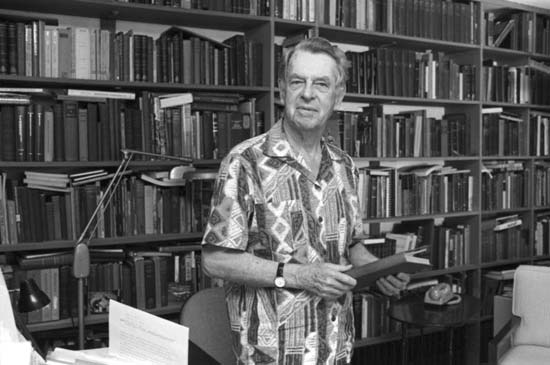
Another work, ‘The Hero with a Thousand Faces’, is what Lucas heavily drew from in shaping the main character of Luke Skywalker. Campbell suggests that ‘mythologies are creative manifestations of humankind’s universal need to explain psychological, social, cosmological, and spiritual realities.’ One thing that jumps out from Joseph Cambell’s studies is that there came a certain point that he gave up on his studies of ‘human anthropology.’
He writes in a journal entry: “Thus one real result of my Los Angeles stay was the elimination of Anthropology from the running. I suddenly realized that all of my primitive and American Indian excitement might easily be incorporated in a literary career. — I am convinced now that no field but that of English literature would have permitted me the almost unlimited roaming about from this to that which I have been enjoying. A science would buckle me down—and would probably yield no more important fruit than literature may yield me!”
Lucas and Campbell both understood that human beings yearn for meaning and they are not inclined to remain skeptical of universal Truths. This much they had right. But, it is there lack of depth in the areas of philosophy and anthropology where the ‘cracks’ begin to show in the Star Wars myth. People long for meaning, Yes! And people create stories and myths to express this longing. But, Campbell proposed that this meaning we seek is created exclusively by ourselves and did not come from a Divine being from outside of ourselves. The nature of the human person is that we are contingent beings. Our existence is dependent on other existence. And the existence of ourselves as persons depends on our biological conception by other persons. The problem with the Force is that it is an impersonal energy field. The Force can’t bring persons into existence because there is no personhood in the nature of its existence. That’s something we can discover just by observing the world around us. We share the same nature as that which brought us into existence. So an impersonal Force would not cause a personal being.
What Han now believes and why Kylo talks to Vader’s burnt mask:
In The Force Awakens, the new characters of Rey and Finn find themselves back in contact with the scoundrel, smuggler, and former rebel general, Han Solo. Han is one of the most interesting aspects of the new Star Wars movie. We find out early on that he has had a conversion about the Force. What he once thought was a ‘hokie religion’, he now says, “It’s true. All of it. The Dark side. The Jedi. They’re real.”
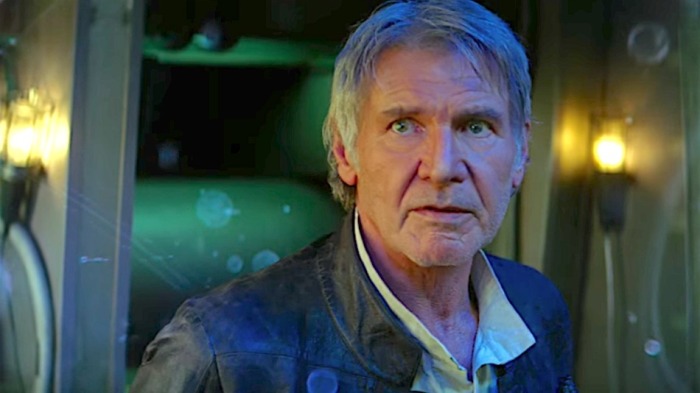
The scene is beautifully set up to contrast the first time Han speaks skeptically of the Force way back in Episode IV. Thirty years ago Han had said he had been all across the galaxy and hadn’t seen anything to give evidence that there is an all powerful Force controlling everything. In the new scene, Han walks around and through a holographic map of the galaxy as he admits that the Force is real. It seems that he has seen some things that he no longer can explain as merely strange. He is now open to the supernatural.
What we soon discover is that Han and Leia’s son, Ben Solo, has been drawn to the dark side by a mysterious figure who is referred to as Supreme Leader Snoke. A goofy name but the character himself is rendered as a scarred being who looks to have spent many years learning the ‘ways of the Force’. We learn that Ben was drawn away from studying under Luke Skywalker to become a Jedi to learn from Snoke how to be more powerful in the ways of the Force.
At the heart of the story we find a son estranged from his family. But, this estrangement is built off a deception about the nature of power and the Force. What I find interesting is what Ben does (called Kylo Ren) when he feels the call to return to the light side. He sits in a room talking with the charred mask of Darth Vader. He asks Vader to show him the power of the Dark Side again. As the audience, we know that the man who was Darth Vader returned to the Light Side before he died and so we wonder why Ben seeks to speak to Vader when he no longer exists as that person. But, this I believe also shows the estrangement and loneliness of Ben and why the Force will never satisfy the human longing. Lucas may have figured out that humans long for meaning, but that meaning needs to be grounded in reality.

But another problem is this: humans do not only long for meaning, they long for meeting, for COMMUNION. The meeting of persons. The communion of persons. Ben Solo cuts himself off from the persons in his life that love him and seek to commune with him. The Force can’t call him back to this communion because the Force is not a person. It is only energy that can be used by people in this mythology for good or bad.
In a sense, Star Wars applies a utilitarian idea toward transcendent reality. The Force is to be USED for good or bad but it is not a person to commune with. It also is described as an invisible energy that exists along with the natural universe. It is not described as preexisting the natural universe or creating existence. This directly conflicts with the Jewish, Islamic, and Christian view of God. It is more akin to the views of deity found in ancient Greek thought and in some of the major oriental religions. Star Wars was always known to be a mishmash of religious beliefs. But, knowing which beliefs are informing the myth is important because it exposes the fallacy of both Campbell and Lucas who both have said that all religions are really talking about the same thing: our desire for transcendence.
So, it could be said that in a real sense Star Wars is a regression and not a progression of religious belief. Christianity has dialogued and replied to these forms of belief through the centuries and while the Church has expressed that these beliefs were in some ways preparing the coming of Christ, it is the revealing of Christ as both God and Man that satisfies the longing of every human heart to commune with God.
Interestingly, Star Wars has a Dark Side to its own mythology. There is constant warnings about the Dark Side from the wise figures such as Obi-Wan and Yoda but there is also a lack of belief in conversion. In the original trilogy both Obi-Wan and Yoda admit that Vader was once Luke’s father but that man is gone and now Vader is all that is left. They essentially tell Luke that he has to confront Vader and that he must be destroyed otherwise the Dark Side will win. Luke counters that he feels good in his father and that he will try and turn him back to the light. The impression you get from Yoda and Obi-Wan is there is no way back once you have been seduced to the Dark Side.
Even when Vader tells Luke that its too late for him, Luke says the haunting lines, “Then my father is truly dead.” Luke resigns to the fact that the apparent nature of the Dark Side is to lead people into an unalterable turn away from the good side. In the end, Vader does turn away from the Dark Side when the Emperor is about to kill Luke. But, this turn comes after Vader had killed Obi-Wan and oversaw the destruction of an entire planet of people without remorse. So, what is Star Wars saying about good and evil or the nature of conversion?
The Prodigal Son
Vader converts not from Luke’s words and pleadings to return to the light side but from nearly being killed by the Emperor. In The Force Awakens, a similar scenario plays out. Han Solo’s son is already, as Yoda would say, “an agent of evil”, but Han is told by Leia that she still senses good in him and asks Han to try and bring him home. At the movie’s climax Han calls out to his son and yells his name, “Ben!” Interestingly, we never hear Snoke use this name. Ben turns around and Han tells him to take off the mask. When Ben asks why, Han says “so I can see the face of my son.” Han walks toward Ben and Ben says, “Your son is dead.” But Han refuses to believe it and warns Ben that if he continues to follow Snoke he will be destroyed by him once Ben is used for what Snoke wants to accomplish. Ben then follows in the steps of Vader and chooses the power of the Dark Side and rejects the call of his father to come home.
You can see some powerful allusions to the prodigal son story that Jesus tells in this encounter and the father seeking out his son and calling him by his real name also strongly resonates. But, in this telling the son kills the father and rejects the call to communion. What makes the myth of the Force crumble is that the Force is both impersonal and is indifferent to good or evil.
The Force Awakens concludes when the other main character, Rey, discovers that she is open to the power of the Force and is able to use its powers to stop Ben from doing greater harm. The movie ends with Rey learning where Luke Skywalker has been hiding. It is implied that he has become powerful with the Force and has found the first Jedi Temple.

The Force Awakens a desire for the Person. The Person of Jesus Christ.
“And the Word became flesh and made his dwelling among us, and we saw his glory, the glory as of the Father’s only Son, full of grace and truth.” John 1:14
The story leaves us with more questions than when the movie began. There seems to be a multi-generational history of Jedi failing to train up new Jedi with them often turning to the Dark Side. The character of Rey, though, is portrayed as new ‘Luke’ figure. So, there is, in a sense a ray of hope. (pun intended) But, there is something in the Star Wars saga that leaves us feeling as if something is lacking. But it is not something we feel lacking, but someone. A Redeemer. A person. It lacks the person of Christ and lacks what truly brings about redemption.

In the later movies (the prequels) it was stated the Jedi believed that a person would come along who would, ‘bring balance to the Force.’ Some Jedi thought that was Anakin and then when he became Darth Vader they believed it would be Luke. We were lead to believe at the end of the original trilogy (Return of the Jedi) that it was Vader killing the Emperor that brought balance to the Force and thus fulfilled the prophecy. But, with now a new evil being in the form of Snoke present in the new film and the son of Han and Leia turning to the Dark Side, it seems that the galaxy far, far away is bound to a certain law of perpetual flux between the Dark Side and the Light Side. (if I were to be cynical, I’d say that this would go on as long as the Star Wars movies remain profitable for Disney).
If this is the way the Star War galaxy is, then we can say for sure that this is another way that the myth does not match reality. The Incarnation of Christ and his death and resurrection has opened the door of salvation to the whole human race and it destroys all the works of the evil one. Death will also one day be completely destroyed and Jesus’ resurrection is the reality of this promise. Jesus doesn’t come to bring a balance between a light and dark side, He comes and destroys the works of the devil. 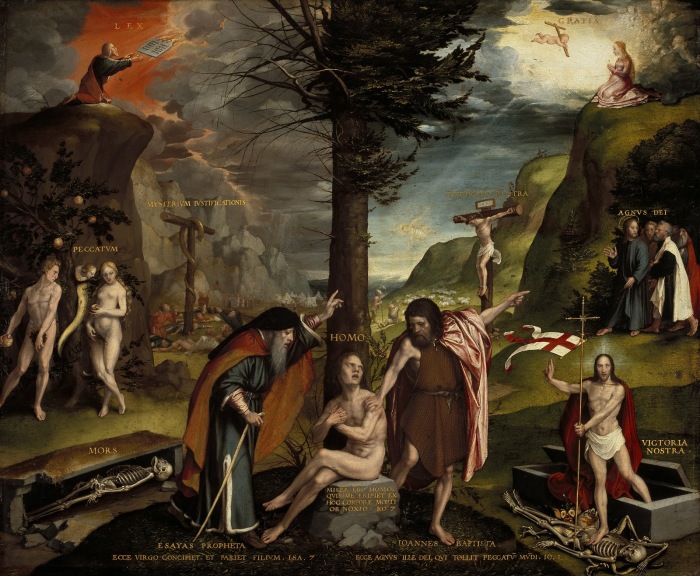
Star Wars suggests that the material world is not important, and instead it is our communing as luminous beings within an impersonal Force that is held out as our ultimate hope.
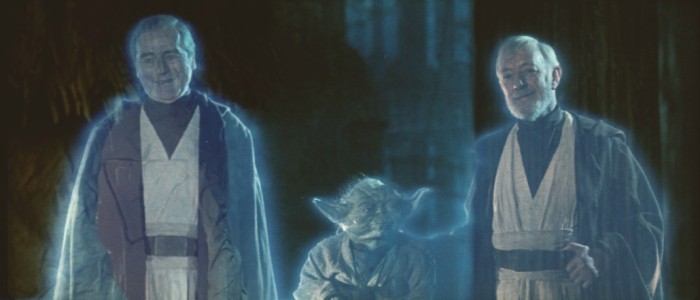
The Christian faith is one that sees the material world as good, so good in fact that Jesus enters into it and receives a human nature. He then raises up creation further by his bodily resurrection from the dead. He then promises not just communion among ourselves but a participation in the loving communion of the three Persons of the Trinity: Father, Son and Holy Spirit. Unlike the Star Wars galaxy where we do not know where things began or where the galaxy is headed, Christian faith sees history having a beginning and a destination.
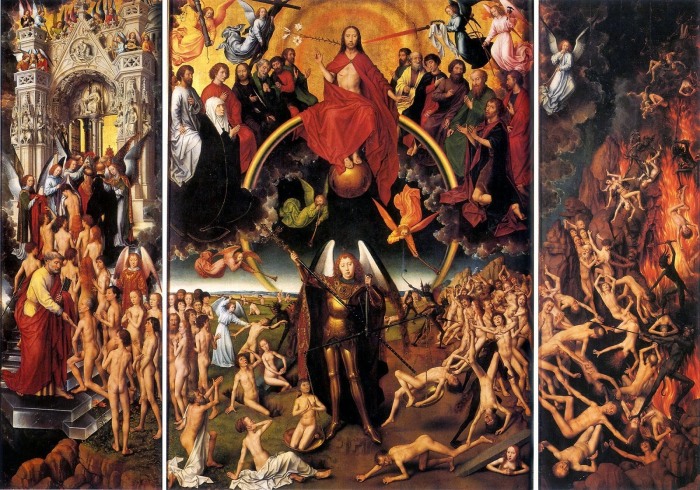
“So then you are no longer strangers and sojourners, but you are fellow citizens with the holy ones and members of the household of God, built upon the foundation of the apostles and prophets, with Christ Jesus himself as the capstone. Through him the whole structure is held together and grows into a temple sacred in the Lord; in him you also are being built together into a dwelling place of God in the Spirit.” Ephesians 2:19-22
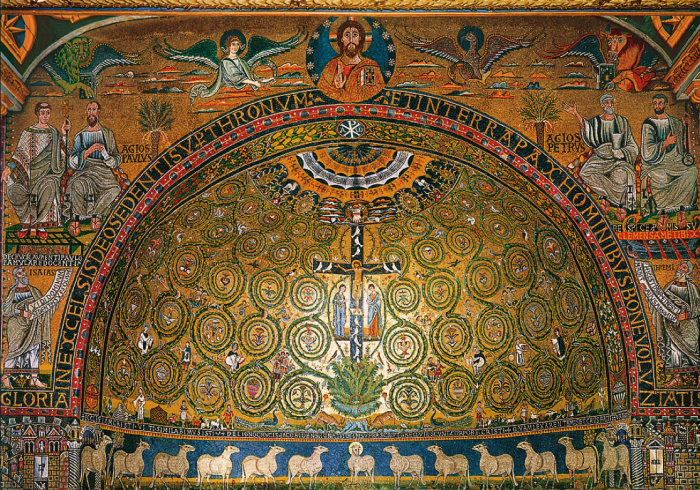
Conclusion
Star Wars has had a large presence in the world over the past forty years. It has made billions of dollars in both ticket sales and merchandise. I grew up always enjoying the original movies and finding the prequel trilogy hugely disappointing. The Force Awakens returns the saga to quality filmmaking. It opens the door to some intriguing story elements and returns the tone to being one of fun and excitement.
As a Christian, I can acknowledge the good themes and relational struggles portrayed that speak to what we really experience in our lives within our families and communities. At the same time, I can say that Star Wars presents a mythology that is at times dissonant from our experiences regarding the nature of faith, religion and the relationship between God and the human person. Star Wars imagines a galaxy without God, but an impersonal Force. Kind of similar to John Lennon’s song ‘Imagine’, that imagines a world without religion (the song came out only six years before the original Star Wars). On that measure, I can conclude that while I don’t mind enjoying the Star Wars movies for their positive qualities, the ‘galaxy far, far away’ is not one I’d ever want to live in. Not now, not later or even a long time ago.
This entry’s emphasis on our desire for communion with a person makes me compare Lord of the Rings to Star Wars. And it seems to me that I like LOTR more because there is a more definite sense of persons, of good and bad. Gandalf, Frodo, and the other heroes do not come to “bring balance,” but to truly destroy evil. Thanks for these posts Michael. 🙂
Thanks for the comment Grant. I have a lot of love for LOTR. Both use fantasy and while Star Wars can be a more fun movie going experience, we can see how when you build a mythos on flawed metaphysics that there is a sense that something is lacking.